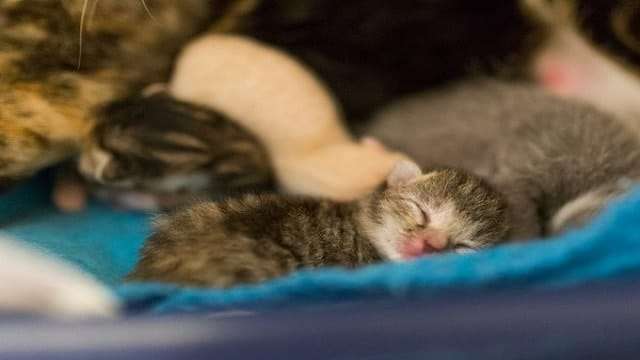Studies in the past have suggested that cat ownership could be linked to certain mental disorders, such as schizophrenia, however, researchers at University College London say they found no link between cat ownership and the development of psychotic symptoms.
Recently published in the medical journal Psychological Medicine, the brand new study is the first to prospectively look at childhood cat ownership and the infection of the parasite called Toxoplasma gondii as a risk factor for psychosis.
Housecats are well known to be the primary host of T. gondii, which does infect various warm-blooded animals (including humans) and causes a disease which is called toxoplasmosis.
According to the US Centers for Disease Control and Prevention, in upwards of 60 million people in the United States may be infected with the parasite.
However, most of the individuals who develop toxoplasmosis experience few to no symptoms because their immune systems keep the parasite from causing illness.
However, in pregnant women and those with compromised immune systems, the disease can cause serious health problems, including damage to the brain, eyes and other organs. Infants who are born to women who are infected with T. gondii during or just before their pregnancy are most at risk for developing severe toxoplasmosis.
Toxoplasmosis can indeed be contracted through undercooked meat and contaminated water, but it can also be contracted through contact with feces which contains the parasite.
Previous research into cat ownership and the development of mental health disorders has been extremely limited, according to Francesca Solmi, the lead author of the study and a research associate in the Division of Psychiatry at University College London.
“Because cats are the primary host of Toxoplasma gondii, it had been suggested that they might put people at increased risk of mental illness, including schizophrenia, by exposing them to T. gondii infection,” she states. “However, some of the studies that have looked at this association had methodologically limitations.”
These limitations included some studies in which researchers asked people with and without mental health problems to remember details about their childhood, which could have led to errors in recall.
The brand new study looked at nearly 5,000 people in the United Kingdom who were born between 1991 and 1992 and followed them until the age of 18. The researchers used birth information to determine whether households had cats when the mothers may have been pregnant and when the children were growing up. At ages 13 and 18 years, the children were brought into clinics to be evaluated for psychotic-like symptoms.
After controlling for potential confounding factors, the study then concluded that cat ownership in pregnancy and childhood did not assume a role in developing psychotic symptoms during adolescence.
“The message for cat owners is clear: there is no evidence that cats pose a risk to children’s mental health,” Solmi stated in a news release. “In our study, initial unadjusted analyses suggested a small link between cat ownership and psychotic symptoms at age 13, but this turned out to be due to other factors.”
She went on to say, “Once we controlled for factors such as household over-crowding and socioeconomic status, the data showed that cats were not to blame. Previous studies reporting links between cat ownership and psychosis simply failed to adequately control for other possible explanations.”
Although the study did not measure T. gondii exposure directly at all, the results do suggest that if the parasite causes psychiatric problems, cat ownership does not significantly increase exposure.
However, other experts now believe that adjusting for other possible explanations may eliminate the cause of the exposure itself. “By itself, household crowding is a risk factor that has been associated with schizophrenia,” stated Dr. E. Fuller Torrey, who is an associate director of research at the Stanley Medical Institute who has also conducted research in cat ownership and toxoplasmosis.
The researchers are continuing to recommend that pregnant women handle cat litter with caution.
“There is good evidence that T. Gondii exposure during pregnancy can lead to serious birth defects and other health problems in children. As such, we recommend that pregnant women should continue to follow advice not to handle soiled cat litter in case it contains T. Gondii,” who is senior study author James Kirkbride of University College London, said in a news release.
Soiled litter boxes are not the only places one can contract the parasite.
“You don’t have to own a cat to be exposed to contaminated feces,” Fuller stated. “For example, cats love sandboxes because of the loose soil.” He warns that any loose soil can easily be contaminated by neighborhood cats.
Solmi went on to say that she is relieved at the results of her study. “Many people own cats, and it’s reassuring that our findings suggest that cat ownership is not associated with an increased risk of mental illness, as previously suggested.”
She strongly suggests that future studies look at replicating this research study to add more evidence.
[mashshare shares=”false”]






